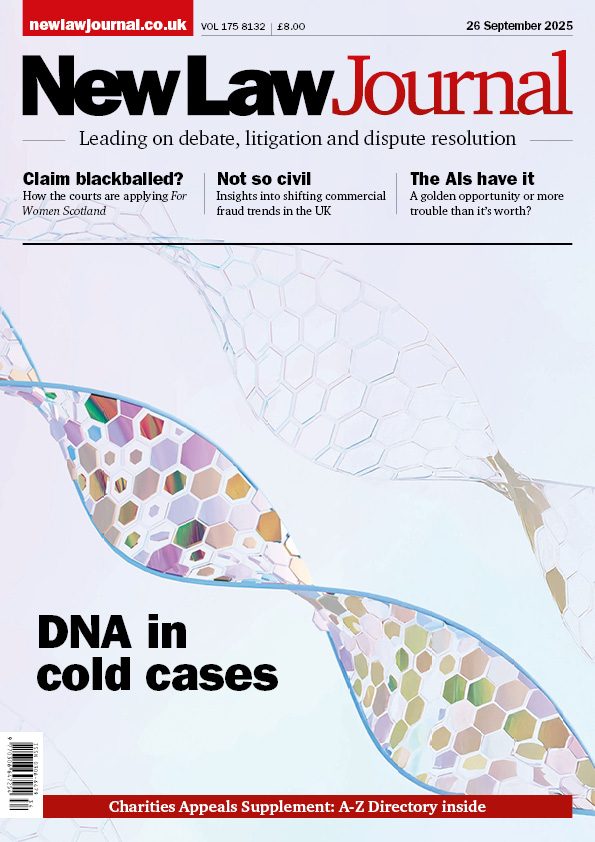THIS ISSUE

The Solicitors Regulation Authority’s Aisling O’Connell on fostering technology & innovation in small firms
The Supreme Court issued a landmark judgment in July that overturned the convictions of Tom Hayes and Carlo Palombo, once poster boys of the Libor and Euribor scandal. In NLJ this week, Neil Swift of Peters & Peters considers what the ruling means for financial law enforcement
Charlie Mercer & Astrid Gillam deliver the data on civil fraud claims in the English courts
Charlie Mercer and Astrid Gillam of Stewarts crunch the numbers on civil fraud claims in the English courts, in this week's NLJ. New data shows civil fraud claims rising steadily since 2014, with the King’s Bench Division overtaking the Commercial Court as the forum of choice for lower-value disputes
Bea Rossetto of the National Pro Bono Centre makes the case for ‘General Practice Pro Bono’—using core legal skills to deliver life-changing support, without the need for niche expertise—in this week's NLJ
Writing in NLJ this week, Victoria Rylatt and Robyn Laye of Anthony Gold Solicitors examine recent international relocation cases where allegations of domestic abuse shaped outcomes
After the Supreme Court judgment that quashed the Hayes and Palombo convictions, Neil Swift considers the wider implications
Small law firms want to embrace technology but feel lost in a maze of jargon, costs and compliance fears, writes Aisling O’Connell of the Solicitors Regulation Authority in this week's NLJ
Charles Pigott of Mills & Reeve reports on Haynes v Thomson, the first judicial application of the Supreme Court’s For Women Scotland ruling in a discrimination claim, in this week's NLJ
MOVERS & SHAKERS

Freeths—Ruth Clare
National real estate team bolstered by partner hire in Manchester

Farrer & Co—Claire Gordon
Partner appointed head of family team

mfg Solicitors—Neil Harrison
Firm strengthens agriculture and rural affairs team with partner return
NEWS
Conveyancing lawyers have enjoyed a rapid win after campaigning against UK Finance’s decision to charge for access to the Mortgage Lenders’ Handbook
The Crown Prosecution Service (CPS) has launched a recruitment drive for talented early career and more senior barristers and solicitors
Regulators differed in the clarity and consistency of their post-Mazur advice and guidance, according to an interim report by the Legal Services Board (LSB)
The dangers of uncritical artificial intelligence (AI) use in legal practice are no longer hypothetical. In this week's NLJ, Dr Charanjit Singh of Holborn Chambers examines cases where lawyers relied on ‘hallucinated’ citations — entirely fictitious authorities generated by AI tools
The Solicitors Act 1974 may still underpin legal regulation, but its age is increasingly showing. Writing in NLJ this week, Victoria Morrison-Hughes of the Association of Costs Lawyers argues that the Act is ‘out of step with modern consumer law’ and actively deters fairness







